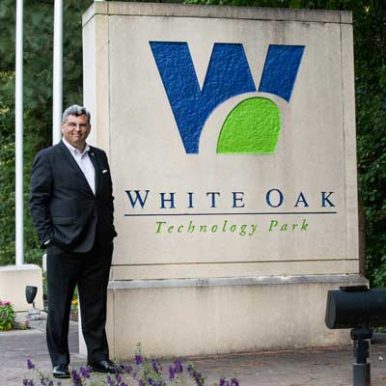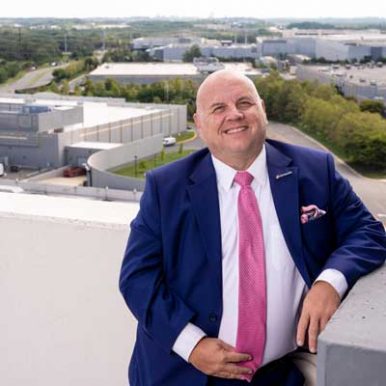Heads in the cloud
Data centers are prime gets for Va. localities
Heads in the cloud
Data centers are prime gets for Va. localities
Compare economic development wish lists across Virginia, and you’ll find one item in common. It’s not a specific manufacturer, a large health care system, or even a lucrative brewery.
It’s a data center — or two, or three.
These massive warehouse-like structures, full of computers, servers, and other digital equipment, hold the keys to internet connectivity, and they have become darlings of the economic development world.
Community leaders laud the many benefits that data centers can bring, from large capital investment and high-paying jobs to significant tax revenues and renewable energy. But they also bring some development challenges, such as requiring large tracts of land and fiber networks. Plus, not every resident wants a massive data center in their backyard.
Even so, data centers are multiplying throughout Virginia. And nowhere is that more apparent than in Loudoun County, which houses the largest concentration of data centers in the world.
Growing demand
“There aren’t that many growth industries in the country right now, places where there is ready capital and ready demand,” says Buddy Rizer, Loudoun’s executive director for economic development. “Data centers would be on that list. In our internal research, we think globally that demand for data centers will outstrip supply for the majority of the decade. The better the commonwealth does [with data center development], the better it is for all of us. It impacts education, … taxes and … quality of life.”
In fact, the data center drive is one of the primary reasons that Will Payne swapped his urban Richmond lifestyle for rural Southwest Virginia. He relocated his marketing business, Coalfield Strategies, to take on a major project to attract economic development investment — including data centers — to Southwest Virginia.
“It’s kind of a point of pride that this region should not be limited to certain industries,” says Payne, who formerly worked as chief deputy for the Virginia Department of Mines, Minerals and Energy, now rebranded as the Virginia Department of Energy as of Oct. 1. “We can go for the growing data center industry.”
Southwest Virginia has some big acts to follow, in particular Loudoun County, which has more than 25 million square feet of data center space.
Other localities in Virginia are attracting data center companies and eagerly eyeing growth, much of which has been sparked in the past year by a pandemic that intensified demand for cloud-based and streaming data services. From streaming movies on Netflix to holding Zoom meetings, if it’s an online activity, it originates from a data center.
“There’s no doubt that COVID-19 significantly increased the need for data or cloud services,” says Stan Blackwell, director of customer service and strategic partnerships for Dominion Energy Inc., one of the state’s top suppliers of power for data centers. “Our view is that this industry is not going to slow down. It’s the adoption of technology by society that’s driving growth.”
Loudoun County’s maximum daily energy use for its data centers is 2 gigawatts — “roughly the equivalent of powering 500,000 homes,” Rizer says. Also, data centers require “miles and miles” of fiber cables installed underground. In Loudoun, companies are adding fiber ducts underneath the center of roads, and the cables need to be replaced regularly. Some date back to America Online’s earliest days at Dulles, where its headquarters opened in 1996.
Henrico County’s data center industry got its start in the mid-1990s, when construction began on White Oak Technology Park, now home to the county’s burgeoning data centers. In 2017, QTS, a data center company, opened a 1.3 million-square-foot building at the park, its fourth-largest location in the world. Since then, Facebook launched the first phase of a $1 billion data center there in 2020, and there’s still 1,000 acres left at the park, says Anthony Romanello, executive director of the Henrico Economic Development Authority.
One of the attractions for data centers in Henrico is a network access point adjacent to the technology park. Established by QTS, the access point links to three ultra-high-speed, subsea fiber-optic telecommunications cables that come ashore in Virginia Beach, connecting data networks in the United States, Europe and South America.

“This is big, big data,” Romanello says. “That’s why this is so critical for the ongoing development of Henrico and of Virginia, really.”
But Henrico isn’t trying to be the next Loudoun County, Romanello says. Rather, Henrico views itself as positioned for international connectivity, and it wants the benefits that data centers have proven to bring to many communities.
In 2017, Henrico slashed its tax rate for data centers from $3.50 to 40 cents per $100 of assessed value, which was likely a big factor behind Facebook’s decision to come to Henrico.
“Data centers are one of our target industries,” Romanello says. “They bring tremendous capital investment, and they are a good, clean industry.”
He points out that Facebook is offsetting its energy consumption at its Henrico data center with in-state solar energy farms. “Even though they consume energy, they are committed to providing renewables equal to what they consume,” Romanello says.
Attracting companies
Like Henrico, other Virginia localities are also lowering tax rates in an attempt to woo data centers.
Dickenson, Lee, Scott and Wise counties and the city of Norton entered into a pact in March to lower data center tax rates to 24 cents per $100 of assessed value to lure the lucrative data centers to Southwest Virginia.
The low rate is one carrot, but another is offering less costly opportunities for renewable energy, says Duane Miller, executive director of the Lenowisco Planning District Commission.
For example, last year, InvestSWVA, a Southwest Virginia economic development marketing campaign directed by Payne, commissioned a study that found that former mining sites in Southwest Virginia would offer natural geothermal cooling cost benefits for data centers. According to the Project Oasis study, companies could save more than $1 million in reduced electric costs and municipal water purchases by taking advantage of the site’s naturally cool underground pools.
“It’s nature’s refrigerator, but that in and of itself is cost savings,” Miller says. “That’s one jewel in our crown for data center recruitment.”
So far, the Project Oasis study results have led to inquiries from some companies, though, as of late August, there have been no announcements of companies intending to locate data centers in Southwest, Payne says.
Conducted by Richmond-based OnPoint Development Strategies, the Project Oasis study identified six Southwest Virginia sites that meet the criteria for a 36-megawatt hyperscale data center, and four sites suitable for a smaller data center of up to 10 megawatts. Also, the study estimates that a large data center in the region would generate more than 2,000 construction jobs, as well as 40 direct jobs and 59 additional permanent jobs. A data center could result in more than $50 million in economic activity annually once operations begin.
“We’re at a point where we are trying to sell the region based on that analysis,” Payne says.
Data centers are responsible for about 13,000 jobs in Loudoun County, including employees working for internet companies that operate inside data center buildings, Rizer says.

When Rizer was trying to sell county supervisors on the idea of building data centers in 2007 and 2008, the county’s population was starting to grow exponentially, with “tens of thousands” of new residents, who were putting a greater burden on county services like schools and emergency responders.
Data centers, however, provide about $15 in revenue for every dollar spent on government services, appealing to cost-conscious politicians — even when they weren’t clear about the technology itself.
“Early on,” Rizer recalls, “one of the supervisors said, ‘Mr. Rizer, if we have this cloud, why do we need these data centers?’ It’s been a constant education.”
In 2018, the average annual wage for Virginia’s data center jobs was $126,250, a 106% increase from 2001, when the average wage was $61,310, according to a 2020 report by Henrico County-based Mangum Economics for the Northern Virginia Technology Council.
“The jobs are very high-paid jobs, they are skills jobs. It’s important work,” says Rizer. The self-styled godfather of Loudoun’s Data Center Alley, he advises countries around the world on data center development.
Typically, data center jobs include equipment installers, engineers, security personnel, operators, and executive functions. And the data centers also result in ancillary jobs, such as HVAC contractors needed to keep the centers cool. Servers running constantly in centers produces heat, but Rizer notes that newer technology allows data centers to operate at an average temperature of 90 degrees, up from 80 degrees several years ago. “Ten degrees may not seem like much, but it is when you’re cooling a 450,000-square-foot building,” he says.
Still, data centers typically are not the largest employers in a locality. What counts the most toward their economic investment is tax revenue, Rizer says. The industry has supplied about $1.5 billion in tax revenue for Loudoun County between fiscal years 2015 and 2021, and Rizer anticipates data centers generating $500 million in county revenue for fiscal year 2022, mainly from business property taxes.
Even so, this year the county received $60 million less in tax revenue from data centers than projected. Rizer attributes the shortfall to some data centers not replacing equipment as quickly as in the past. Also, “we as a county are so far out ahead of everybody else, we’re still figuring out how to project it,” he says.
In Virginia Beach, economic development officials see data centers as drivers of large capital investment and a complement to growth in the city’s tech industry and its subsea cable connectivity.
PointOne Development Corp., a data center developer, is now building the first of two data centers at Virginia Beach’s Corporate Landing Business Park, which also houses Globalinx Subsea Colocation, a carrier-neutral, colocation data center space that provides access to the MAREA and BRUSA high-speed subsea telecommunications cables that connect Virginia with Spain, Puerto Rico and Brazil.
Smaller data center companies also are inquiring about space in the Corporate Landing Business Park.
Globalinx is key to many of these daily inquiries, says Taylor Adams, deputy city manager and director of economic development for Virginia Beach.
“When those [subsea] cables were originally built, we didn’t have the ability to offload and distribute signal [bandwidth] here in Virginia Beach,” he says. “Globalinx was part of the solution to that problem. Now we can take advantage of the bandwidth. We are seeing considerably more activity.”
Like other economic development officials, Adams expects data center demand will only continue to grow. “In professional environments with telework and remote work being part of the framework, it’s going to increase the need for cloud computing solutions and data storage,” he says. “I think that’s very good for the data center industry, and Virginia Beach is well positioned for that.”
Develop vs. preserve
But not everyone wants to see data centers multiply.
In Prince William County, which already has a significant data center presence, Elena Schlossberg leads The Coalition to Protect Prince William County. She is opposed to data center development in areas that should be preserved, including close proximity to neighborhoods and in the county’s rural crescent, which has been designated for preservation.
“We know that data centers are not going away, but we believe they belong in the appropriate places,” says Schlossberg, who has lived in the county for 20 years. “We are turning into a digital gateway.”
Conversely, another group of Prince William County landowners wants the county to become a digital gateway and allow for more data center development. At least 12 landowners who live on Pageland Lane want their agricultural land, which already holds numerous Dominion Energy transmission lines, rezoned to allow up to 21 million square feet of new data centers. They call the project the Prince William Digital Gateway.
Although the county already has about 4.75 million square feet of data centers, these residents want more in order to bring jobs, help the county’s tax base and allow Prince William to compete economically with neighboring localities such as Loudoun. Plus, they want money for their land, claiming that the area’s once-rural atmosphere already has been disrupted by transmission lines and traffic.
“Where we live now is not the same as it was 22 years ago,” says Mary Ann Ghadban. One of the landowners leading the digital gateway project, she has lived in the county for 40 years. “Our way of life has been ruined. Our area is no longer rural. As landowners, we want to win. Why shouldn’t we make money off our land?”
There already are discussions underway with data center developers who are interested in the Pageland Lane land, she says.
“This is citizen activism at its best,” Ghadban says. “It’s the golden goose for us. It’s the golden goose for Prince William County. It’s a win-win.”
This article has been corrected since publication.



















